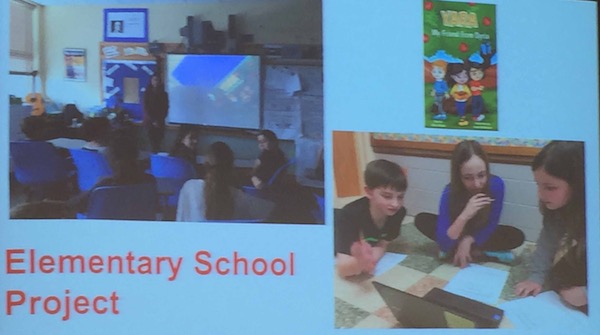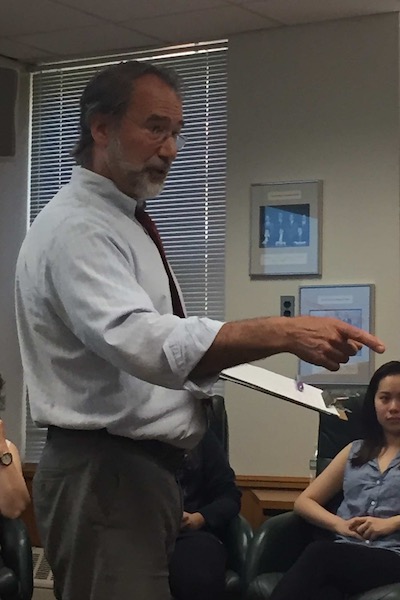"Students for Refugees" Club Increases Refugee Crisis Awareness
- Category: On Our Radar
- Published: Tuesday, 02 May 2017 15:20
 Politicians and the media have thrown around phrases like "extreme vetting" recently, but these groups have done little to explain what that means. Additionally, despite the over 65 million people displaced from their homes during what the UN has called the "highest level of displacement on record," little has been done to put a human face to the problem. Fear mongering and a lack of education have thwarted efforts to accept and settle refugees.
Politicians and the media have thrown around phrases like "extreme vetting" recently, but these groups have done little to explain what that means. Additionally, despite the over 65 million people displaced from their homes during what the UN has called the "highest level of displacement on record," little has been done to put a human face to the problem. Fear mongering and a lack of education have thwarted efforts to accept and settle refugees.
Enter Scarsdale High School's "Students for Refugees" club (SFR). Two years ago, SHS social studies teacher Ms. Maggie Favretti created a cultural and historical exchange program with a school in Germany, a country that has accepted over a million refugees since the beginning of 2015. The students from SHS and Heidelberg, Germany met with refugees and local resettlement organizations. Moved by what they learned, the students created a bi-continental club to help refugees. Since then, Ms. Favretti has taken a second group of SHS students to Heidelberg and is starting to gather interested students for an exchange next year. Also, SFR has spread to other high schools and is beginning to expand to colleges. Its mission is to help refugees through community education, fundraising, and advocacy.
On Friday, April 27, SFR hosted a meeting open to the community to further its mission. Club members described how their organization was founded, its goals and how those goals evolved in light of recent executive orders, and its fundraising.  Then, SHS junior Hannah Schmelkin described some of the work she has done to educate younger students about refugees. For example, she recently visited a fifth grade class at Quaker Ridge and presented an age-appropriate curriculum educating students about the refugee experience in America. As part of her visit to the elementary school, she read the students Yara: My Friend from Syria, a children's book about a Syrian refugee. The fifth graders later read the book to the third graders, further spreading its message.
Then, SHS junior Hannah Schmelkin described some of the work she has done to educate younger students about refugees. For example, she recently visited a fifth grade class at Quaker Ridge and presented an age-appropriate curriculum educating students about the refugee experience in America. As part of her visit to the elementary school, she read the students Yara: My Friend from Syria, a children's book about a Syrian refugee. The fifth graders later read the book to the third graders, further spreading its message.
Then, SFR introduced Mr. Chris George, executive director of IRIS (Integrated Refugee and Immigration Services), a large nonprofit agency in Connecticut that helps settle refugees who have been accepted into the United States. Mr. George gave an extensive and extremely informative lecture discussing the process a family might go through from becoming displaced persons (among over 65 million forced from their homes due to persecution and/or extremely unsafe conditions), to refugees (among the 21 million of the displaced who are able to flee their home country), to residents of a refugee camp such as the United Nations-run Zaatari refugee camp in Jordan, to families in the camp lucky enough to be selected to be screened for potential refugee status by the United States government.
Exhausting as that process is for an already overwhelmed family, it is just the beginning of the United States refugee vetting process, which for Syrian refugees takes a minimum of eighteen months to two years and beyond. During that time refugees continue to live in overcrowded and potentially dangerous camps, often with no access to education for the children and inadequate food. First, representatives from the United States visit the camp to interview the "most vulnerable families," of those who have applied, selecting those who are in the most precarious situations rather than those who would be the most desirable immigrants. Then, after an approximately three hour long interview, the family waits several months while their answers are verified. If accepted to the next stage, potential families are subjected to a longer, more aggressive questioning by the United States Department of Homeland Security, which is followed by a six to seven month waiting period. During this time, the United State government verifies claims by interviewing witnesses, checking various types of documents varying from requests such as the proof of employment in the form of invoices from a bakery that an interviewee claimed to run, to diplomas, to official documents, photographs, and other methods of verification such as iris scans or DNA tests. They also look for evidence to determine whether the family has given any aid whatsoever to terrorist forces, which of course automatically excludes them from acceptance into the program. If a family passes this extremely rigorous screening, they are then given a health screening. After a successful screening, the family is granted United States refugee status, a status granted to nearly 85,000 persons in 2016.
They also look for evidence to determine whether the family has given any aid whatsoever to terrorist forces, which of course automatically excludes them from acceptance into the program. If a family passes this extremely rigorous screening, they are then given a health screening. After a successful screening, the family is granted United States refugee status, a status granted to nearly 85,000 persons in 2016.
At that point, if the family does not have relatives in the United States, they are randomly assigned the state to which they will relocate. The family then must pay for or sign a promissory note agreeing to pay for the cost of the airfare to the United States. If the family is assigned to relocate to Connecticut, there is a good chance that IRIS will be assigned to help with their resettlement. With as little as two weeks' notice, Mr. George's nonprofit organization, which is funded from both federal and private sources, will set up an apartment for the family with furniture and food. They meet with the newly arrived family and provide them with warm clothing, car seats, or other immediate needs. Then, within two hours of their arrival in the United States, the government mandates they are given "a culturally appropriate hot meal" to welcome them to our country.
The road thereafter is hard but workable. Resettlement agencies help refugees find entry level jobs, enroll children in schools, and connect them with medical providers to take care of their physical and mental health needs. Many refugees have experienced very traumatic events and resettlement agencies work with people such as Arabic-speaking psychiatrists who can help them process their past experiences as they adjust to their new lives. Refugees are expected to pay their rent and integrate into society. According to Mr. George, "the prime directive in resettlement is to help refugees gain control over their lives through self-sufficiency." His agency does a great deal to help them get there.
After Mr. George's presentation, Westchester Refugee Task Force co-founder Ms. Mary Refling announced that the Syrian refugee scheduled to speak was unable to attend the meeting due to a miscommunication. She then showed a video called "Sana's Story" which follows a 24-year old Syrian refugee living in New York, available online here.
SFR is looking not only to expand its membership but also to raise money to help educate refugees who often spend years without the opportunity to go to school. Details can be found on Ms. Favretti's Schoolwires page, here.






